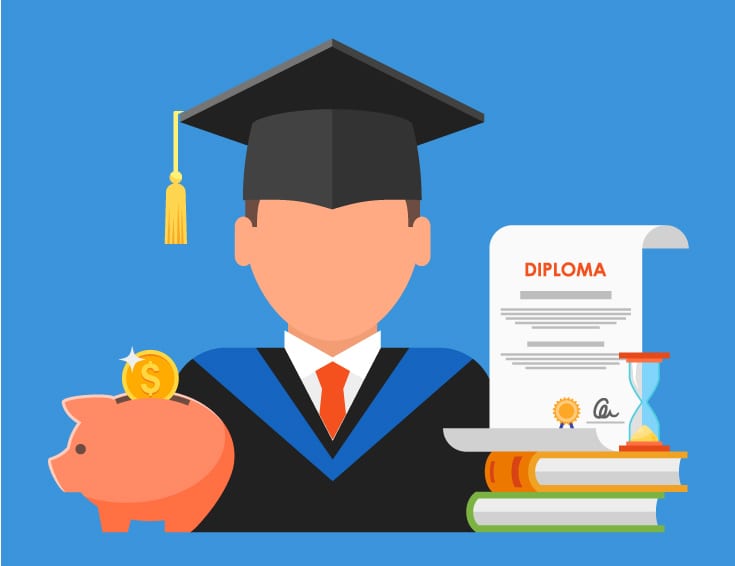There is no doubt that your student loan payments put a strain on your budget, and you may have several reasons to make a late student loan payment. This includes your financial situation or even a simple mistake. Although missing a student loan is quite common, millions of borrowers are at least a single month behind or delinquent.
Delinquency, even though it’s quite common, doesn't indicate that you will not be punished for it, and the principal outcomes of the missed debts could be late fees or credit damage. But if you even fail to catch up with the student loan late payment grace period, then tax refund and wage garnishment could arrive once the loans enter default. You could get out of delinquency in many ways, but it is always better to avoid it if you can.
Differentiating between student loan delinquency and loan default
Loan Delinquency
Your student loan might be considered delinquent when as a borrower, the payment is not made by you on the due date. Therefore, when you miss the Navient late payment grace period, the chances are that your delinquency would be reported to the credit bureaus when 30 or more days are past due.
When as a borrower, 90 or more days are past due, then serious delinquency might occur. Serious delinquency clearly shows that there is a likelihood that you will default on the loan as a borrower. This is the reason why loan delinquency is given so much importance.
Loan Default
When you fail to make the required loan payment for an extended period as a borrower, your student loan would surely be considered a default. You may not be able to benefit from student loan late payment forgiveness when your Federal Student loans are 270 days delinquent, whereas the private loans are in default when they are four months or 120 days delinquent.
It is worth noting that not every delinquency may progress to default, and technically speaking, a federal student loan cannot be in default until 360 days delinquent. But as the default claim needs to be filed within 90 days, the majority of lenders tend to wait until the claim period ends.

What are the consequences of late student loan payments?
When we talk in technical terms, a loan is considered delinquent if the due date is missed by even a single day, but your lender won’t be doing anything that quickly. The majority of lenders don’t take any step until it is two weeks overdue. If the payment is made before that, then the lender removes delinquency status from the account, and it can be in good standing again. Here is what you should be expecting if you pass the student loan late payment grace period.
-
30 days late
Your loan servicer might charge you 6% of the missed payment, and it could be 5% in case of Sallie Mae’s late payment. If you make a partial payment, then there is a possibility that it will charge a fee on the outstanding missed payment. If you have paid late for multiple loans, then you might have to pay the fee for each late payment.
-
90 days late
In case the loan is 90 days late, then you may not be eligible for student loan late payment forgiveness, and your loan servicer will be reporting to all three credit bureaus. You should keep in mind that more than 100 points will drop your credit score if you make a single late payment. Therefore, it will be harder for you to get credit cards and secure loans in the future.
-
270 days late
After 270 days, your loan will be in default. This clearly means that the entire unpaid balance is due, and you will not even be eligible for forbearance and deferment. The Navient late payment grace period is also a maximum of 6 months, so your credit will be damaged even further, your tax refunds and other benefits will be seized, and the loan servicer will garnish your wages.

Different ways to avoid late student loan payments
Although it will not be disastrous to miss one loan payment, if you even forget the student loan late payment grace period, you will need to pay the past owed sum before risking any outcomes. The most reliable way for you to get back on course is to examine why you dropped behind.
-
Misremembering the payment due date
It is always better to enroll with an autopay with your lender or servicer. This way, the owed amount will automatically be deducted from the account each month. This way, you will not be worried about paying late again, but it is better to retain a focus on the account balance for any overdraft fines.
-
The bill wasn't received by you
The most suitable option for you is to verify your contact information, as you are accountable for the return of student loan on time yet if you have not obtained the bill. It is always better to be completely certain that your student loan provider has your refreshed contact information.
-
You had a short-term financial problem
You have the option to pause repayment with forbearance or deferment. Still, deferment can be a much safer alternative because the government gives the interest on specific federal student loans throughout this break. One may pass for postponement on particular occurrences, like taking state or federal assistance or unemployment compensations.
-
You are not able to afford long-term payments
After identifying the best possible solution, you can contact your servicer. You can ask to waive off Sallie Mae’s late payment if this is your first time missing any payment. There are bright chances that you may be given a pause, particularly if you like to avoid any further late loan payments.

Summary
Generally, there are no consequences for being late or missing the student loan payment for a minimum of 30 days. However, if you miss the student loan late payment grace period, then you can face serious consequences, which include a drop in your credit score or your wages being garnished. Therefore, it is important to look for solutions regarding late payments quickly, and the best answer depends on why you are making late payments and how you could tighten up the budget for choosing a new repayment plan.
FAQs
Is your credit score affected by late loan payments?
The late loan payments are not reported to the credit bureaus in the majority of cases, and this doesn’t affect the credit rating as well. Unless the loan payment is late from 45-90 days, you will not have any issues.
Can the late student loan payment be removed from credit report?
Normally your late student loan payment will not be removed from credit report for approximately seven years. Therefore, it may not be possible for you to get it off your credit history.
How late can one be on student loan payments?
The lenders usually report late payments after 30 days. It is obvious that default can happen earlier for the private loans, i.e., after 120 days, hence harming your credit further.